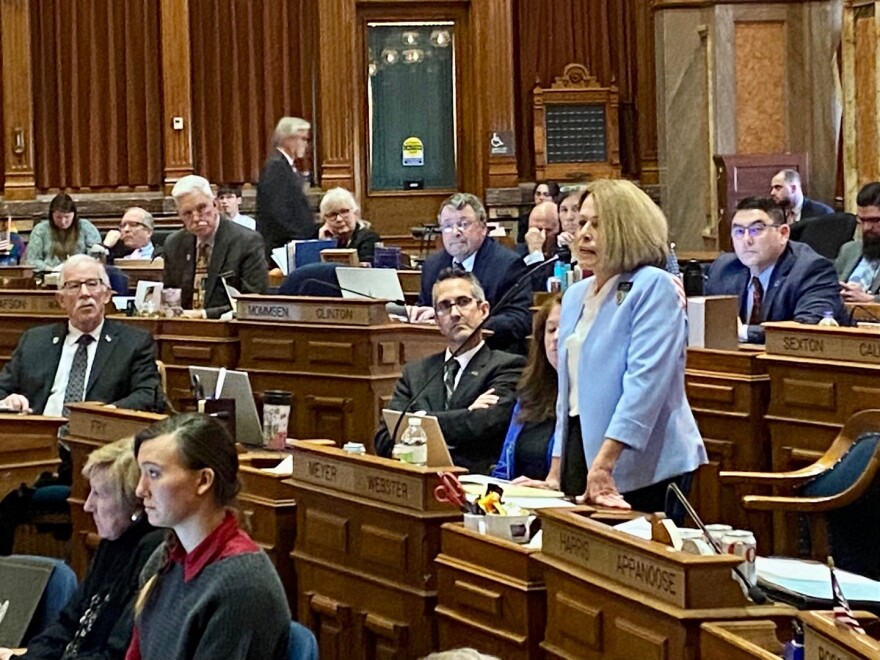Most Republicans in the Iowa House and Senate voted to send a bill to the governor’s desk Wednesday that would limit how much money victims of medical malpractice could get for non-economic injuries like pain and suffering.
The bill, a priority of Gov. Kim Reynolds, would cap non-economic damages awarded by juries at $2 million when a hospital is involved and $1 million for malpractice by an independent clinic. Starting in 2028, the caps would increase by 2.1% each year.
Reynolds said in a statement the bill will allow Iowa’s health care industry to become stronger and more accessible.
“To the OBGYNs and physicians who have been worried about practicing in Iowa, we are ready for you!” she said. “These reforms balance the needs of injured patients with the needs of all Iowans to have a robust health care system.”
But Democrats and several Republicans disagreed, saying this denies justice to Iowans in cases of severe injury or death, and that they don’t think it will do much to improve health care access in the state.
The Iowa House passed the bill 54-46 Wednesday, with 11 Republicans joining most Democrats in opposition, and one Democrat joining most Republicans to vote yes. The Senate passed the bill shortly after in a 29-20 vote, with five Republicans joining all Democrats in opposition.
Under the bill, economic damages and punitive damages would remain unlimited. The bill would change the current law that sends 75% of punitive damages to a state fund and instead allow plaintiffs to keep 100% of punitive damages.
It would also create a task force to make recommendations for reducing medical error rates.
Rep. Ann Meyer, R-Fort Dodge, managed the bill’s passage in the House. She said big jury verdicts in some medical malpractice lawsuits are making it harder to recruit doctors in the state.
“The intent of the bill is to make sure that we provide health care to Iowans, all Iowans, 3.2 million, rural Iowa, metro Iowa,” Meyer said.
She said the bill will give certainty to insurance companies and stabilize insurance rates for health care providers.
Meyer said she also knows what it’s like to deal with loss from medical malpractice because one of her twin sons died from a medical error as a small child.
“I was very angry at that time as well,” Meyer said. “No amount of money will bring Nick back, and I feel that loss every single day.”
She said her other son is in his first year of medical school, and she wants him to be able to work in Iowa. Meyer said lawmakers should also consider the loss that happens from a lack of health care access.
Rep. Mark Cisneros, R-Muscatine, voted no. He said life is priceless, and the government shouldn’t be trusted to make a one-size-fits-all determination of the monetary value of life. Cisneros said the rights of the individual must always come first.
“What amount would you accept if your spouse was killed, or your child? No amount of money can right that wrong,” he said. “But when justice is owed, can you say $1 million is just? Can you say $2 million is just? I can’t.”
He said he suspects the legislature will do nothing to change this policy in the future when they see that it hasn’t brought more medical providers to Iowa. Cisneros said this hasn’t worked in other states, and all it will do is boost profits for insurance companies.
Cisneros urged his colleagues to vote no, and said they shouldn’t vote for it just because GOP leaders made the bill a priority.
“Will you seriously allow yourselves to be bullied into bending your moral compass away from the people of Iowa, and point it directly toward the billion-dollar corporations who want this handout?” he asked.
Rep. Sami Scheetz, D-Cedar Rapids, said his mother was affected by medical malpractice when she had cancer. He said the bill seeks to put a price on people’s suffering, and that is wrong.
“This bill is being sold as a plan to fix rural health care,” Scheetz said. “But it’s actually an insurance bill that will benefit wealthy insurance companies the most.”
Rep. Brian Lohse, R-Bondurant and Rep. Megan Jones, R-Sioux Center, offered an amendment to change the damages cap to $5 million and to ensure that a viable fetus injured by medical malpractice is considered a person by insurance companies. The amendment was rejected.
Lohse said Iowa’s insurance industry is already stable and has insurers entering the market. And Jones pointed out that a nonpartisan analysis estimates there will only be 13 medical malpractice trials in the state each year.
“Those 13 people—they deserve their day,” Jones said. “They deserve to be adequately compensated. But this bill caps their access to justice.”
Republican Rep. Norlin Mommsen said he struggled with deciding how to vote on the bill, but he supported it because he’s worried about what would happen if his family members had an emergency and were too far from a hospital to make it in time.
“I’m going to err on the side of giving all of us a chance to get to that hospital to try and get that care,” Mommsen said. “Because if you don’t get there, it doesn’t matter what the limit is—whether it’s $1 million, $15 million, $97 million.”
The changes will take effect immediately upon the governor’s signing of the bill, and will apply to medical injuries that occur after the bill is signed.




